Author: David C, Bankless; Translator: Tao Zhu, Golden Finance
In the saturated L1 field, differentiation is often not just about throughput or transaction costs, but also about vision, architecture, and execution.
Sui is a competitor not only because it provides another high-speed public chain, but also because it has built an integrated modular ecosystem that aims to reshape the way applications are built and deployed in the decentralized world.
From DeFi to games, from institutional infrastructure to social primitives, Sui is quietly building a framework for a completely on-chain Internet-and public chains are just the beginning of the Internet.
Let's take a deep dive into the momentum we've seen and the next wave of catalysts we're tracking.
Bull Market Progress
Those catalysts we focused on in our last update a few months ago? They've arrived.
From BTCfi's momentum to new mechanisms for optimizing blockchain performance, things that were once "coming soon" are now truly landed and operational. Let's take a look at how things develop.
BTCfi is on a roll
Sui is working to position itself as the go-to platform for Bitcoin DeFi, leveraging its MoveVM-based security to attract $BTC capital that is wary of the smart contract risk that comes with on-chain yields.
While Sui is still in its early stages, its efforts have proven successful, with $BTC derivatives already accounting for 10% of its total locked assets (TVL). Sui has attracted projects like Satlayer, Lombard, Babylon, and Stacks (coming soon), with more in the pipeline like Native, Nativse, and Rhei Finance.
Mysticeti v2 is now live
Sui’s Mysticeti v2 upgrade to the parallelized consensus mechanism is now live, which will speed up transaction confirmations for DeFi, gaming, and other high-throughput use cases. Common transactions like token transfers or NFT minting now do not require full consensus and take a faster path, resulting in faster execution times and reduced network load.
Walrus is now live
In late March, Sui’s blockchain-neutral storage solution Walrus officially launched on mainnet and airdropped 4% of its total supply.
Walrus has seen rapid adoption, with 17.5% (725 TB) of capacity already occupied as upcoming L1 nodes like Plume and Linera partner with it, and NFT projects like Claynosaurz and Pudgy Penguins also using it to store content. The token price has risen by about 66% from its launch day low, and using $WAL on platforms like Suilend, STEAMM, Scallop, and Cetus can receive generous liquidity incentives.
Ika is about to launch on mainnet
After receiving $21 million in funding, Ika looks to be on the verge of launching on mainnet.
Ika enables you to control and use assets like $BTC or $ETH securely across blockchains - like a secure remote control that keeps assets secure on their native chain and available on other chains. To do this, it uses a 2PC-MPC model distributed across hundreds of nodes, making tampering nearly impossible. This greatly expands the DeFi space, allowing new cross-chain lending, staking, and trading, and projects such as Full Sail, AeonHQ, and Ekko are currently building on Ika.
Protocol Upgrades
One of the highlights of Sui is that it provides modular, out-of-the-box tools to develop not only a chain, but also a full-stack infrastructure with built-in solutions for liquidity, storage, messaging, and more.
This full-stack approach recently saw a major update with new releases in liquidity, networking, and privacy:
DeepBook 3.1
Sui's native order book engine has ushered in a new upgrade, introducing multiple features.
DeepBook is Sui’s shared liquidity layer, which provides a dedicated liquidity pool for each asset for DeFi applications to access, meaning DeFi applications don’t need to build liquidity themselves.
With v3.1, the protocol now offers permissionless liquidity pools, lower fees, flexible fee payment methods, and smarter fund management.
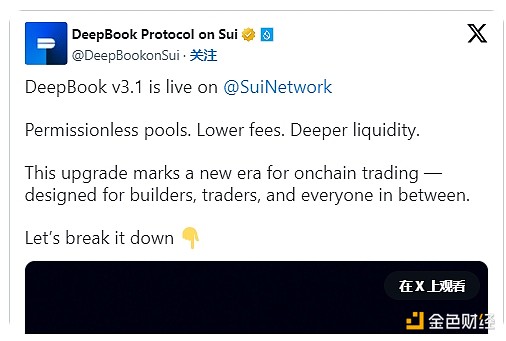
SCION
Next up is the progress of SCION, a next-generation network protocol that provides a reliable and secure way for validators to communicate even during DDoS attacks or internet outages that could take other blockchains offline.
By bypassing failures and enforcing trusted paths, SCION will help Sui stay online at critical moments, representing an important part of Sui’s vision to build a new full-stack infrastructure that serves not only cryptocurrencies but the entire internet.
SEAL
On the security side, SEAL is an encryption and access control system, still in testnet, that allows developers to set custom data-sharing rules—for example, allowing access to files only to NFT holders or during a certain time period.
Working with Walrus, SEAL enables applications to manage private data directly, keeping sensitive content secure while still accessible through programmable permissions.
Nautilus
Also in beta is Nautilus, a system that uses a trusted execution environment (TEE) to offload complex operations to a secure external machine and then verify the results on-chain.
TEEs are growing in popularity, and Unchain uses them to securely order transactions, reducing harmful MEV manipulation. Nautilus will bring this tool to Sui, enabling more use cases such as private AI systems, data feeds, or complex game logic without overloading the blockchain.
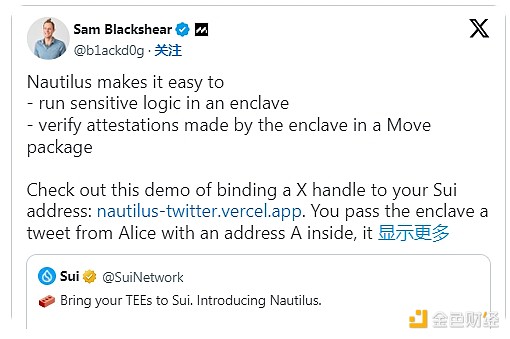
Technical Updates
In addition to these protocol additions, Sui’s base layer has also seen significant improvements, including:
Move VM 2.0 — 30-65% faster transaction execution, especially under high load.
Remora — Allows validators to scale across multiple machines, handling massive growth without slowing down.
Pilotfish — Further enhancements to parallel transaction execution, increasing throughput by 10x through improved validator economics.
Move Registry (MVR) — Allows developers to use simple smart contract names instead of long strings, improving code transparency and interoperability.
SIP-45 — Improves fairness in MEV by increasing the speed of transactions that pay higher fees, helping them complete transactions faster and avoid front-running.
Ecosystem Updates
Sui’s growth over the past few months is reflected in its ecosystem, with daily active users tripling over the past three months as new wallets accounted for the majority of active wallets during this period.
The surge in new users shows that more eyes are turning to the ecosystem. In addition to the booming DeFi sector, this growth may also be driven by institutional announcements and developments in the entertainment and gaming sectors.
DeFi
Sui DeFi continues to grow, with total locked value (plus stablecoins) reaching a new all-time high. DEX trading volume remains strong, matching or even surpassing the levels when $SUI was close to its all-time high.
DEX aggregator Cetus leads with monthly trading volume of ~$5.5 billion and cumulative trading volume of ~$51.5 billion. It is worth mentioning that perpetual contract platform Bluefin is currently in second place, with monthly trading volume of ~$1.7 billion after integrating universal swaps.
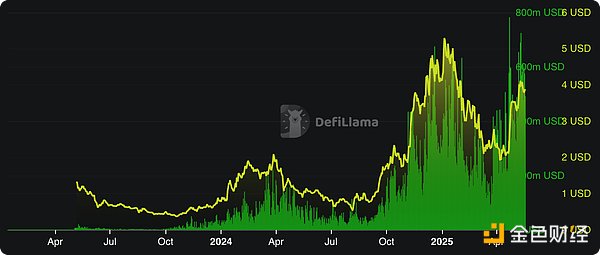
Growth was also supported by Kraken supporting $USDC transfers on Sui, new bridges from Allbridge, Axelar and LI.FI via Jumper, and Phantom’s full integration with Sui.
Looking at the protocol landscape, the top three players are as follows:
Suilend ($675M TLVL) — DeFi suite including lending (Suilend), decentralized exchange (STEAMM), and liquidity staking (SpringSui). Deployed token launcher, permissionless LST creation, and fee-free lending. In Sui’s lending market, it holds ~48% market share.
NAVI ($534M TLV) — Lending platform with the highest open lending volume, whose Astros aggregator achieved ~200% quarterly growth in Q1 vs. Q4.
Cetus ($235M TLV) — Decentralized exchange that powers the majority of Sui’s volume. Has launched Auto Vault LP, with plans to add more third-party vaults.
Institutional Investors
Sui has seen rapid growth in institutional investor adoption, with new partnerships emerging in the financial sector.
Most notably, the Athens Stock Exchange is working with Sui to develop an on-chain order book proof-of-concept platform using zero-knowledge confidential bidding to test how blockchain transparency can improve traditional markets.
Sui’s investment pipeline is also expanding with Canary Capital and 21Shares filing for $SUI ETFs. 21Shares is also working with Sui on new products and research as it moves into the US market, following previous interest from Grayscale, VanEck and Franklin Templeton.
Meanwhile, Trump-backed World Liberty Financial has added Sui assets to its reserves (Eric Trump holds $SUI), while Fireblocks is preparing to launch custody support for Sui.
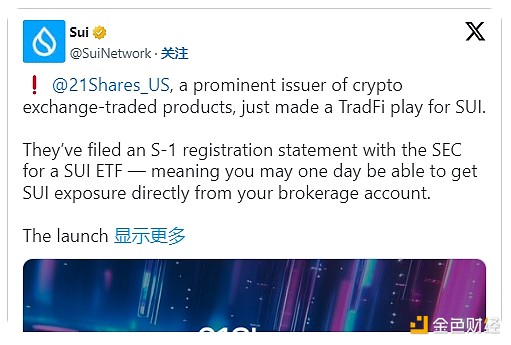
Entertainment & Gaming
Entertainment & Gaming use cases are booming on Sui, with impressive progress across multiple verticals.
SocialFi platforms stand out, with RECRD, a short video content monetization platform, being Sui’s top app for the past three months, with around 1 million daily active users and over 100 million transactions. In second place, with 128,000 daily active addresses, is FanTV, an AI-powered platform for creators to make music, videos, and podcasts, while users can earn tokens for participating.
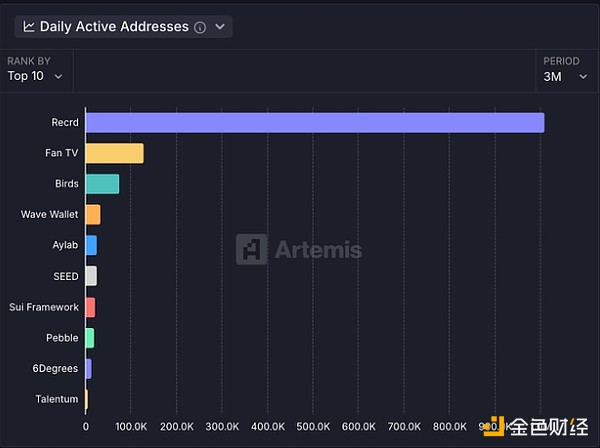
Another popular app is DoubleUp, a “GambleFi” and prediction platform based on its Unihouse protocol that allows users to stake tokens and earn returns tied to the volume of bets on the platform. DoubleUp recently closed a $4 million funding round and announced plans to further expand its sports betting business, continuing the momentum of last week’s $UP TGE.
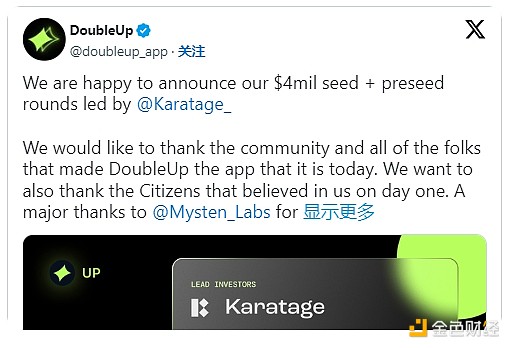
The most notable headline in the mainstream application space came from Parasol, a platform acquired by Mysten Labs that aims to help create, manage, and trade digital assets in traditional gaming experiences. Parasol recently appeared in Pokémon HOME’s privacy policy, sparking speculation that its new “badges” may be based on the blockchain. If true, this would mark a major step in the integration of cryptocurrency with one of the gaming giants.
Parasol’s acquisition fits in with Sui’s broader gaming strategy, alongside a slew of new releases in the first quarter and the upcoming Sui Play 0X1 — a “crypto Switch” handheld gaming console with a built-in wallet and game store. Though unreleased, the device reportedly has 70 games in development from more than 65 studios, ranging from indie titles to AAA blockbusters.
In traditional entertainment, horror director Eli Roth is working with Walrus Protocol to tokenize movie IP, giving fans a stake in upcoming films. Meanwhile, MoviePass launched a closed beta of MogulPass, a fantasy sports-like app on Sui where users draft actors and directors and earn points based on real-world performance.
Future Outlook
Overall, Sui's strong momentum in BTCfi, DeFi, institutional applications, games, and social applications highlights its ambition to be not just another Layer-1, but a complete decentralized stack.
Sui founder Adeniyi Abiodun detailed how Sui is committed to fully replacing today's walled gardens. Applications on Sui do more than just have a chain - they get built-in liquidity through DeepBook, verifiable storage through Walrus, secure access through SEAL, high-performance networking through SCION, and off-chain computing through Nautilus. All of this is modular, open, and composable.
Sui's recent growth shows that this approach is working. BTCfi protocol chose Sui because of its security, social applications are scaling to millions of users, and institutions are exploring on-chain markets - all of which attract it for more than just speed. Even so, much of the infrastructure is still in testing and competition is fierce. But as more products come online and prove themselves in production, we’ll see whether Sui’s vision of a composable, open internet can be realized.
 Hui Xin
Hui Xin
 Hui Xin
Hui Xin Brian
Brian Aaron
Aaron YouQuan
YouQuan Hui Xin
Hui Xin Aaron
Aaron Joy
Joy YouQuan
YouQuan Brian
Brian Alex
Alex